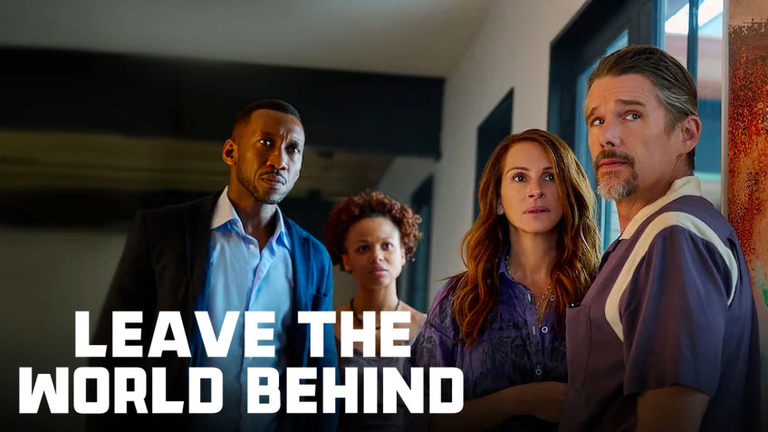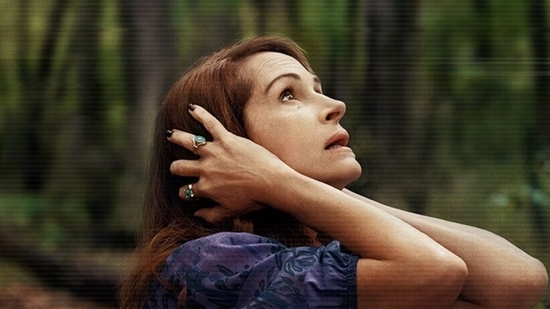Leave the World Behind: Book or Film?
The novel 'Leave the World Behind' was undoubtedly my favourite read of 2023. Whilst it took a while to understand the direction it was taking, particularly as the opening chapters detail the love hate relationship one has with one's kids, and husband, and things as banal as a shopping list or a stone bench top in an Air BNB, it quickly began to stand out as a novel that Was Trying To Say Something.

Fun fact - there was a conspiracy that Ethan Hawke and Kevin Bacon were the same guy, as they'd never played in a film together before. Esmail defied this conspiracy by putting them together
“Do you think the power is going to go out?” Clay thought the day—the smell of yellow sponge, the percussion of the rain—seemed almost unnervingly normal. “It goes out in storms, doesn’t it? Like, downed branches? And if there’s something wrong in the city. And then that noise, whatever that was? I think we’re lucky that it’s still on, but maybe we shouldn’t push our luck.” Amanda looked at her husband. “Go!” ― Rumaan Alam, Leave the World Behind

Julia Roberts hides from the awful noise in the movie version of the book. Image source
The basic premise sounds intriguing enough - Amanda and Clay hire an Air BNB on Long Island for some time with their teenage son and daughtera little luxury in a glorious home they've rented, complete with a pool - a break from life in NYC. Yet one night, there's a knock on the door - an older couple, Ruth and G. H.,claim it's their home, and want to stay. They claim a sudden power outage caused them to flee the city. With no internet, it's impossible for Amanda and Clay to verify this - and there's also the fact this couple is black, and should they trust them, and is it really their house? Is it safe? Should they be there?
Some people really hated the book as they found it frustratingly vague. What exactly did happen to bring the world to it's knees? The author never tells. It could be anything - world war, nuclear, plague - any number of apocalypse. There are hints in various flashforwards that confirm that indeed, this is the apocalypse. But it's precisely because it's such scaled back horror where you don't know what's going on that plays into our anxieties and dread. There's this feeling of discomfort and unease, undercut by the very fragile nature of our relationships with others, including our family. Sure, they're a middle class white couple we shuld have very little in common with, yet, it's precisely their ordinariness and their frailities that make us invest in what happens to them, even if we don't care about them that much.
We can still relate, though. We can still relate to the worries they have about their future, their children's future, their place in the world. The existential dread they have.
“You told yourself there was an end to the worry. You told yourself it was sleeping through the night, then weaning from the breast, then walking then shoelaces then reading then algebra then sex then college admissions then you would be liberated, but this was a lie. Worry was infinite. A parent’s only task was to protect his child.” ― Rumaan Alam, Leave the World Behind
The book seems to say that society in on the edge of collapse and it's the divisions between us that are going to make the downfall much, much worse - that we need to rely on each other, not be frightened of each other, because we face the same common enemy (whatever that may be) and we all have things in common, like fear for our children.
It also ask to consider what happens when we can't find out what we need to in the manner we've become accustomed. If the internet goes down, how do we find out what happened, and what to do, in order to protect ourselves?
The movie itself asks similiar questions, and explores the same themes of the novel - and in that way, I think Esmail did a great job. Although I immediately noticed how the Netflix film strays from the novel, there were many important scenes that the director didn't ignore. I could see why he made the choices he did - such as more explicit disasters bleeding into the character's lives in the film. An fuel tanker, for example, runs aground on the beach, and two planes fall from the sky. I am not sure a Netflix audience would have stayed for the duration of the film without some explicit apocalypse, like the Tesla self drive cars smashing into each other, blocking the route out of the city.
There's a whole heap of scenes the film doesn't quite get right, like the teenagers going missing whilst the panicked parents look for them, and just how disconcerting it is for G.T to find that a man he thought was his friend (played by Kevin Bacon in the film) wasn't really, not when it came to the end of America as they knew it. The book is far, far more unsettling - yet the film does manage to convey a little of that.
“If they didn’t know how it would end, with night, with more terrible noise from the top of Olympus, with bombs, with disease, with blood, with happiness, with deer or something else watching them from the darkened woods—well, wasn’t that true of every day?” ― Rumaan Alam, Leave the World Behind
The author, Rummaan Alam, said of the different ending that it achieved the same thing he wanted, so he was good with that. I do love how films don't have to be the same as the novel, and in fact, sometimes it's by digesting both of them that we get a bigger, richer story.
Theirs was a failure of imagination, though, two overlapping but private delusions. G. H. would have pointed out that the information had always been there waiting for them, in the gradual death of Lebanon’s cedars, in the disappearance of the river dolphin, in the renaissance of cold-war hatred, in the discovery of fission, in the capsizing vessels crowded with Africans. No one could plead ignorance that was not willful. You didn’t have to scrutinize the curve to know; you didn’t even have to read the papers, because our phones reminded us many times daily precisely how bad things had got. How easy to pretend otherwise.”― Rumaan Alam, Leave the World Behind
Look, I'm a little biased - I'm an avid devourer of anything apocalyptic. I adored Station Eleven, both the book and the series, which I think is in a simliar vein. If this is also you, I'd recomend the film - but I'd also beg you to read the Alam's novel first, as without a doubt, it's the far superior version of this unsettling tale.
“What the fuck?” This was, maybe, the only proper response. Amanda was not talking to George. She was not talking to anyone. “What the fuck?” She said it a third time, a fourth time, a fifth time, it didn’t matter. She kept saying it, and it was unanswered, as a prayer.”
― Rumaan Alam, Leave the World Behind
It's funny reading online criticism of this film. It really divided audiences. People want a disaster movie like 2012 or something with constant action. They don't want to think about existential stuff, or do a deep criticism of how we ended up this way. And goodness, they hate an ambigous ending.
Have you seen it? What did you think? Have you read the book?
With Love,

Are you on HIVE yet? Earn for writing! Referral link for FREE account here
Dear @riverflows your recommendation to read the book first before watching the movie is very wise. I have not yet read the book or seen the movie. However, the experience usually is that people watching the movie first end up skipping reading the manuscript. I believe that the idea is to promote reading and that pleasure can only be achieved by holding the book in your hands.
Even if someone is not a fan of books or movies of this genre, I am convinced that in the reading itself, of any genre, they will achieve higher states of satisfaction and awaken that internal gene that drives them to want to read and read some more.
Thank you very much for sharing these brilliant analyses!.
Based on the enthusiasm you express in your summary and the perspective you present from the author of the book, I will definitely add "Leave the World Behind" to my list of potential readings. I am intrigued by how you describe the author playing with tension and uncertainty, and how they manage to convey a sense of discomfort and anxiety throughout the story. Greetings, @riverflows!
I haven't read the book or seen the show, but I think that when people think about the apocalypse, we want to see the mayhem and how protagonists cope with all that uncertainty. Explosions too. Lots of explosions :)
As I mentioned, I haven't come across the story but one thing that you mention is that there is no clear explanation of what has caused the problem, so this makes it difficult for the reader to think about how one would react in this scenario. The movie's message is that we have to stick together and not let divisions get to us, but as we know from the covid pandemic, this might not be necessarily a good thing because of the potential to infect others or enter into conflict with them (if they don't want you around). In this scenario we should 'stick apart' and respect one another's boundaries and human rights until a solution has been found or the problem resolves itself. Our actions would be different, however, if the source of the problem was an asteroid or nuclear war. In that case, the correct course would be to come together and rebuild. I'm sure we'd still find a way to quibble and make a mess of things, but lessons sometimes need to be learned the hard way.